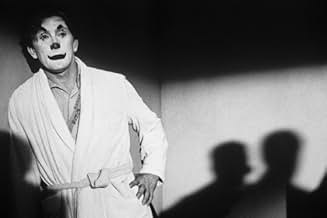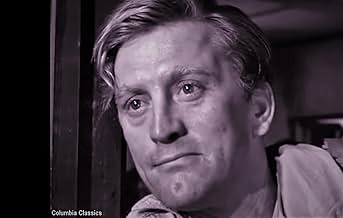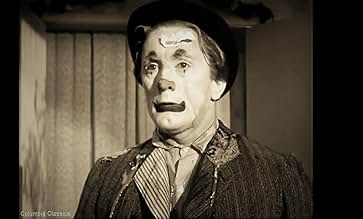In 1949, former concentration camp inmate and Berlin native Hans Muller, immigrates to Israel where, due to psychological problems, he can't adjust to peacetime life.In 1949, former concentration camp inmate and Berlin native Hans Muller, immigrates to Israel where, due to psychological problems, he can't adjust to peacetime life.In 1949, former concentration camp inmate and Berlin native Hans Muller, immigrates to Israel where, due to psychological problems, he can't adjust to peacetime life.
- Awards
- 1 win total
- Yehoshua Bresler
- (as Joey Walsh)
- Willy Schmidt
- (as Oscar Karlweis)
- Mukhtar
- (scenes deleted)
- Hannah
- (uncredited)
- Refugee
- (uncredited)
- Papa Sander - Susy's Father
- (uncredited)
- Bus Driver
- (uncredited)
- Telephone Girl
- (uncredited)
- Audience Member
- (uncredited)
- Mordecai
- (uncredited)
Featured reviews
"Surviving the horror" could be another title for "the juggler" .A Jew ,who has lost all his family and who has known the concentration camps comes back to the promised land in 1949.Life during WW2 camps has often been described,but life AFTER the nightmare is a subject which has rarely been told in movies with a few exceptions ("die Morder sind unter uns ":Susanne's character and "Exodus": the young man played by Sal Mineo).But never as successfully as here.
Hans cannot forget.His psyche is shot."I'm the juggler and the juggled" . He tries to find back his dear departed although he knows they were killed.He suffers from claustrophobia and Douglas makes us FEEL his disease (the film owes a great deal to this extraordinary actor),and every time he sees men in uniform ,he thinks of his torturers.
Admirable sequences: Douglas in the desert town ,with all these walls which imprison him ,and those men around who are threats .The minefield where the distraught man and his young pal are rescued by their fellow men who form a human chain.
In his absorbing memoirs,Douglas wrote that he once helped Dmytryk who was one of the Unfriendly Tens .But when they made "the juggler" ,the director acted as if they had never met.Douglas thought he was ashamed for having been an informer.But he did not judge him at all.What would I have done if I had been in his shoes ? he wrote.
Many films might suggest that Dmytryk was suffering from of a strong guilty feeling: "the sniper" with his burned arm,José Ferrer's arm in a sling in "Caine Mutiny" .And in this film ,Douglas "gagging" his arm-mouth ,or covering it to hide his tattooed number.
I agree with all the precedent users.A film which must be restored to favor.
Unfortunately, Kramer had a habit of assigning George Antheil to score his films. Antheil contributes another inappropriate score heavily accenting any melodramatic moment that points up Kirk's anguish, much the way he did in Kramer's NOT AS A STRANGER. It didn't work there and it doesn't work here, especially during the "escape" scene where the music reaches a frenzied fever pitch of discordant notes.
It's hard to fully sympathize with Douglas' tormented character and that is the film's chief handicap. As the man tracking down the fugitive, PAUL STEWART does his usual workmanlike job. Trouble is, there's an almost documentary feel to the story and its pivotal character is never fully fleshed out, remaining somewhat of an enigma despite Douglas' good performance. When romance comes into the story with the entrance of MILLY VITALE, Douglas' character softens a little under her compassionate care.
Some vivid glimpses of Israel, circa 1949, and good location photography gives the story an authentic air, but the story values are never more than ordinary and the total effect is bland.
Worthwhile mainly for Kirk Douglas fans, it fails to make the impact intended as a serious study of a man haunted by prison camp memories.
In the opening sequence, a group of Jewish refugees are being bussed to their new living encampments in the new state of Israel. The children on the bus are understandably frightened; they're asked questions by uniformed officers who claim they're classifying them for their safety-and this time, they're supposed to believe everything's going to be alright. Kirk calms down a little girl by drawing a face on his hand and distracting her with humor, but he's also frightened. Immediately after the audience is lulled into a sense of security, he approaches a woman with her children who he believes is his long-lost family. He cries and begs her to remember him until his friend whispers in his ear, "Your family is dead, Hans. You've seen the certificate." It's an incredible scene, not only because of Kirk's heart-wrenching performance, but because it shows the audience the post-war emotionality of survivors. How can they possibly relax and trust when they've lived through such horrors and are missing their family and friends?
My one comment on this movie is the uneven storyline. The beginning follows Kirk's introduction to his new home, but when he runs away after a violent run-in with a policeman, he takes up with a young boy, Joey Walsh. He and Joey hike the countryside, often acting as though they haven't a care in the world. Kirk even meets up with the beautiful Milly Vitale and strikes up a romance, but this lighter side is far from the true point of the story. Perhaps the filmmakers felt audiences couldn't handle another hour as heavy as the first twenty minutes, which I understand.
Chances are you've never heard of this movie. I hadn't, and I've seen dozens of Kirk Douglas movies. If you can find a copy, you'll get to see an incredible performance in a groundbreaking drama. It might not be one you'll want to watch over and over again, because it is upsetting, but you'll be very glad you found it. Start looking. You owe it to Kirk Douglas to see this movie.
Did you know
- TriviaThe film is based on author Michael Blankfort's novel with the same title. Initially, producer Stanley Kramer wanted Blankfort to direct the film but he was refused a passport for travel to Israel by the United States State Department because he had been a Communist many years earlier. Kramer re-assigned the film to director Edward Dmytryk who served almost a year in prison in 1948 after being convicted of contempt of Congress for refusing to divulge his political affiliations. After his release from prison, Dmytryk moved to England but returned to the U.S. and gave testimony before the House Committee on Un-American Activities and, as a result, was removed from the film industry blacklist.
- Quotes
Registration Official at Haifa: Name?
Hans Muller: [softly] Hans Muller
Registration Official at Haifa: You have to speak louder
Hans Muller: HANS MULLER's my name
Registration Official at Haifa: A little softer please. Place of birth?
Hans Muller: Germany... Munich... Beautiful city
Registration Official at Haifa: Occupation before the war?
Hans Muller: You wouldn't believe me
Registration Official at Haifa: I'll believe anything
Hans Muller: I was a juggler.
Registration Official at Haifa: What?
Hans Muller: A juggler
[pantomimes juggling balls in the air]
Registration Official at Haifa: We need a juggler like a hole in the head. What can you do besides throwing things up in the air and catching them?
Hans Muller: My dear sir, to say I throw things up in the air and catch them is like saying Shakespeare just wrote words. Would you care to see my scrapbook?
Registration Official at Haifa: No. Show it when you look for a job... if there are any for jugglers
Hans Muller: I'm retired. I havent thrown up anything but bad food in ten years
Registration Official at Haifa: So what else can you do?
Hans Muller: I can wash dishes, sweep barracks, clean toilets. I can also smile while being beaten by fists, feet, straps and long rubber hoses. I can be used as a guinea pig for new drugs and old poisons. All of which we learned as guests of the Nazis.
- ConnectionsFeatured in The Dick Cavett Show: Kirk Douglas (1971)
- How long is The Juggler?Powered by Alexa
Details
- Runtime
- 1h 24m(84 min)
- Color
- Aspect ratio
- 1.37 : 1






































